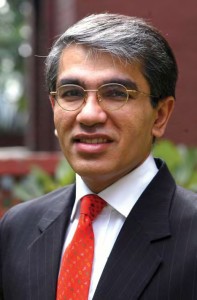|
58% of India`s youth is not work ready or suffers from some kind of skill deprivation. While the privatisation of skill development is an important solution to the problem, the bottom of the pyramid of skills needs huge public policy intervention in skill delivery and financing. Manish Sabharwal, Chairman, TeamLease Services Private Limited, shares more on the skill pyramid, with Digital Learning. |
Other than proving its unique presence as a staffing company, what spaces does TeamLease operate in?
Teamlease is a people supply chain company that provides a range of temporary and permanent staffing solutions to its 1000+ clients. To provide our core services we also offer regulatory compliance, pension fund administration, payroll processing, online customer service and candidate assessment.
Is professional education an important part of a CV of an entrepreneur?
Entrepreneurship is not a qualification but an attitude. Entrepreneurs do more than what people think is possible with less than what people think is needed. They challenge the status quo. They put together teams of people and make them accomplish more than what they thought was possible. I do not believe that education hurts but I am pretty sure that professional qualifications do not necessarily make for entrepreneurship skills. In fact, the most successful entrepreneurs do not do things themselves but cobble together teams of people who are better than than them. Entrepreneurship requires persistence, patience, vision and boldness.
You have entered into partnerships with different State government for Skill Upgradation trainings. What is the thinking behind such new initiatives? Is this a need/demand of the time for a staffing and HR company, to go for skill upgradations?
Teamlease is a people supply chain company running out of inventory. We estimate that more than 58% of India`s youth is not work ready or suffers from some kind of skill deprivation. While the privatisation of skill development is an important solution to the problem, the bottom of the pyramid of skills needs huge public policy intervention in skill delivery and financing. Our partnerships with state governments are designed to produce youth who have the skills that employers need.
What are the major trends in skill development education that you see?
India`s labour market and skill crisis has its roots in three problems; matching (connecting supply to demand), mismatch (repairing supply for demand) and pipeline (preparing supply for demand). We think that policy and private initiatives will cover the whole spectrum of issues. The privatisation of skill development will happen in some skills but policy will have to undertake a broad based review of how the supply (candidates) can be produced for the demand (employers).
Which are the areas that you provide skill development services in? How do you train your employees? Is there any effort by TeamLease to convert raw material into ready talent?
We are working with over 20 training companies to manufacture employees to our 800+ Ideal Candidate Profiles (ICPs). We conduct entry gate assessments and direct our interview rejects to our training partners. We are also now considering exit gate certifications that will signal the credibility of trained candidates to employers. Our client base pretty much covers the GDP; blue collar, services, manufacturing, sales, admin, etc so our engagements are pretty broad.
|
India`s labour market and skill crisis has its roots in three problems:matching(connecting supply to demand),mismatch(repairing supply for demand)and pipeline(preparing supply for demand) |
With the current lull and retrenching in the Indian job market, what is the future of employees?
Most people do not realise that this global crisis makes India a more attractive destination in the medium term (2+ years). What is happening in India is not once in a decade or once in a millennium but once in the lifetime of a country. Losing jobs is always a personal tragedy but a year of low tide was probably overdue after so many years of high tide. I think the hyperinflation of employee costs and real estate was making India a hostile habitat for entrepreneurship over the last few years and this slowdown will make us competitive again. We must also keep things in perspective around job losses, because 93% of Indians work in the unorganised sector for whom job security, social security and workplace safety are distant dreams.
How do you see the country`s vocational training system? Do you notice any problem in it?
India`s vocational training system has many challenges. Financing is not linked to outcomes and therefore is not self-healing and often does not lead to employment. Government financing is only available for government delivery and therefore government delivery does not have clients but it has hostages. The system does not distinguish between repair and prepare while those are different thought worlds. The system does not have effective entry gate assessment or credible exit gate certification. There are other issues around the use of technology, teacher training, outdated curriculum, and much else.
In one of your article you quoted the Nobel Laureate Sir Athur Lewis` hypothesis, `a developing nation`s wages rise quickly when the surplus labour supply from rural areas tapers off`. So will the recruitment focus shift from urban markets to smaller towns




















